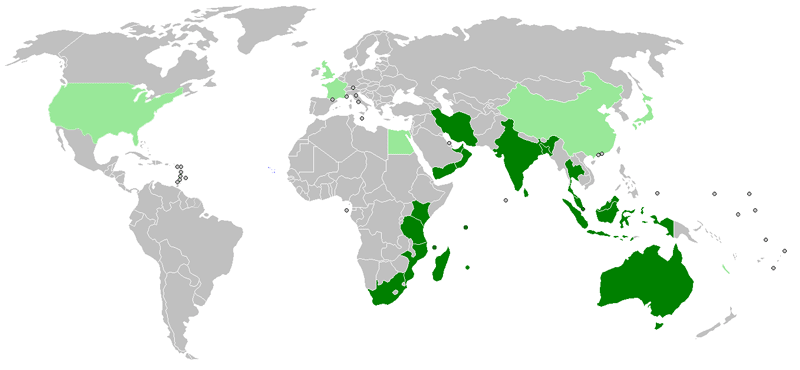Indian Ocean regionalism – picking up the pattern of connectivity
Posted By Anthony Bergin on March 17, 2014 @ 12:15
It’s fair to say that, despite the existence of initiatives and organisations such as the Indian Ocean Naval Symposium (IONS) [2] and the Indian Ocean Rim Association (IORA) [3], Indian Ocean regional architecture is under-developed. This reflects a lack of shared interests relative to some other regions, including limited economic and strategic integration, great socio-economic disparities, and modest people-to-people links. Yet there’s benefit in seeking to address Indian Ocean transnational issues by regional means.
I recently attended a workshop in Mauritius organised by IORA, in association with the S. Rajaratnam School of International Studies in Singapore, on ‘IORA and Strategic Stability in the Indian Ocean’. I was asked to address the question of what IORA can do to build trust, confidence and effective security cooperation. Here are the key points of what I said in Port Louis.
IORA is the only body with a broadly-based agenda that spans the region and meets at ministerial level. But it has struggled to find common ground among its diverse membership and suffered from institutional weakness (its secretariat has fewer than ten people). This has led to narrow project-focused agendas and an absence of strategic focus.
Australia (as chair for the next two years), India, (the immediate past chair), Indonesia (the current vice chair), and South Africa (which intends to nominate to succeed Indonesia in two years), should drive a more productive IORA agenda. South Africa’s intention to nominate for vice-chair is welcome, as it’s keen to strengthen IORA’s work program and practices. But these four countries need to avoid any sense of dictating to IORA’s smaller members.
IORA has agreed to work on six priority areas: maritime safety and security; trade and investment facilitation; fisheries management; disaster risk management; science and technology and academic cooperation; and tourism and cultural exchanges. The ‘Perth Principles’ Declaration [4] on the peaceful, productive and sustainable use of the Indian Ocean and its resources was issued at IORA’s annual meeting in Perth in November last year and should guide IORA’s future work.
IORA should be using projects on oceanography and meteorology as a base for exploring more systematic work on the ‘blue’ economy. The Indian Ocean remains one of the least studied and understood of the world’s oceans, so IORA should support projects such as the ambitious International Indian Ocean Expedition 50th Anniversary Initiative [5] (PDF).
Climate change is a huge issue for countries like Bangladesh, Seychelles and the Maldives. IORA should have a wider agenda on risk mitigation and humanitarian assistance arrangements in the Indian Ocean region. For example, an IORA protocol on humanitarian assistance and disaster relief could be useful.
lORA’s work on maritime security should complement any IONS initiatives. If IONS were to develop operational ‘pointy end’ type working groups, like the Western Pacific Naval Symposium has done [6], then IORA should make sure it didn’t duplicate work on maritime affairs and was more strategic than IONS.
Ministers and senior officials need to be more involved in IORA’s work. For example, fisheries ministers could be engaged in work on fisheries management or science ministers in fostering collaboration on oceanic research. IORA should get regional buy-in by establishing regular senior officials meetings in each of the priority areas. Ad-hoc working groups could address thematic areas and facilitate strategic discussion in areas such as maritime cooperation.
The Perth communique noted [7] the possibility of a formal post-meeting dialogue between lORA member states and Dialogue Partners. That’s a good idea and Australia should encourage Dialogue Partners to engage with lORA through association with and contribution to specific lORA initiatives, either financially or by in-kind support. An lORA Dialogue could be established after each annual meeting along the lines of the Pacific Islands Forum Post Forum Dialogue.
There’s an lORA Business Forum, but there are limited opportunities for senior business representatives at the annual IORA ministerial meeting for them to gain access to Ministers. To boost private sector engagement we need something like an Indian Ocean event, which could be held alongside IORA’s Ministerial meeting, equivalent to the Africa Down Under conference [8] and designed to attract business and government officials.
lORA has an Academic Group as part of its structure, but it would get greater traction if it were a genuine Indian Ocean second track body focussing on IORA’s current concerns, just as CSCAP [9] engages closely with the ARF.
The Indian Ocean is the ‘great connector’ between Asia and Europe and countries around the rim. IORA’s core priority should be to keep the Indian Ocean as a peaceful maritime highway, where all can prosper. IORA should have strategically focused meeting agendas to maximise discussion, driven by ministers, on core Indian Ocean regional cooperation issues.
My key message in Port Louis was that IORA needs a comprehensive engagement strategy with Indian Ocean government officials, academics and business. We want Indian Ocean elites to pick up the pattern of connectivity.
Anthony Bergin is deputy director of ASPI. Image courtesy of DFAT [10].
Article printed from The Strategist: https://aspistrategist.ru
URL to article: /indian-ocean-regionalism-picking-up-the-pattern-of-connectivity/
URLs in this post:
[1] Image: https://aspistrategist.ru/wp-content/uploads/2014/03/IORA.png
[2] Indian Ocean Naval Symposium (IONS): http://www.ions.gov.in/
[3] Indian Ocean Rim Association (IORA): http://www.iora.net/
[4] ‘Perth Principles’ Declaration: https://aspistrategist.ru/regional-architecture-iora/
[5] International Indian Ocean Expedition 50th Anniversary Initiative: http://iocperth.org/IOCPerth/images/stories/bom_iioe2_presentation_FINAL_170214_dadamo.pdf
[6] like the Western Pacific Naval Symposium has done: http://www.navy.gov.au/media-room/publications/semaphore-july-2006
[7] noted: https://www.dfat.gov.au/geo/indian-ocean/perth-communique-2013.html
[8] Africa Down Under conference: https://aspistrategist.ru/bread-and-stones-africa-australia-opportunities/
[9] CSCAP: http://www.cscap.org/
[10] DFAT: https://www.dfat.gov.au/geo/indian-ocean/iora.html
Click here to print.
